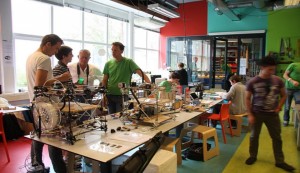High-tech fabrication lab for coming for students, public
Bob Piper For Chronicle Media — September 9, 2015In the latest bid to encourage high-tech manufacturing in Southwestern Illinois, Lewis and Clark Community College (L&C) in cooperation with Boston’s world-renowned Massachusetts Institute of Technology (MIT), are preparing to this fall open the Confluence Fab Lab, a state-of-the-art fabrication laboratory with 3-D printing capability, in Edwardsville.
The Edwardsville facility will be latest in a series of small-scale digital fabrication workshops, under development around the world by the MIT-based Fab Foundation. Some 432 have already been established around the world.
The new Confluence Fab Lab, on L&C’s N.O. Nelson Campus at 600 Troy Road, is expected to attract interest from across Southern Illinois and the St. Louis region. The nearest of existing 80-plus fab labs in the U.S and Canada are in Chicago and Fulton, Mo.
Fab labs are equipped with an array of flexible computer controlled tools to make “almost anything,” according to Fab Foundation literature.
They typically center on a “rapid prototyper,” such as a 3D printer, designed to make plastic or plaster parts. Computerized numerical control (CNC) milling equipment — guided by precisely programmed commands (as opposed to traditional manual control utilizing wheels or levers) — can then be used to finish parts. High tech cutting devices, such as laser, plasma, and water jet cutters are available for handling sheet materials.
To produce any necessary digital electronics, the labs provide design, assembly and test stations, including high-precision printed circuit milling devices that create circuit traces on pre-clad copper boards.
Also offered is somewhat more traditional equipment, such as welders and hand tools, in addition to electronics benches, a finishing area, an assembly area, and a secure storage area. Desktop computers and conference rooms are available to facilitate administrative functions.
At the new Confluence Fab Lab, large glass windows will allow onlookers a chance to watch projects finalized at the assembly area. Completed projects will be displayed in shadowboxes in the lab’s entryway.
The Edwardsville fab lab will be located in space formerly occupied the Southwest Illinois Advanced Manufacturing (SIAM) Center, which lost its funding several years ago.
The Confluence Fab Lab is intended in large part for L&C science, technology, engineering, art and mathematics (STEAM) students, who will have use of the facility weekdays from morning until about 2 p.m.
However, the lab will then be open to the public through the afternoon and evening hours.
Use will require a fee-based membership and completion of special training to ensure users know how to operate the equipment safely and properly.
The fab lab program began as part of broad MIT program to explore “how the content of information relates to its physical representation and how an under-served community can be powered by technology at the grassroots level,” according to project literature. It grew out of a popular MIT class, “How To Make (Almost) Anything”.
The program was launched in 2001 as collaboration between the university’s Grassroots Invention Group and Center for Bits and Atoms, under a grant from the National Science Foundation. The MIT Center for Bits and Atoms still administers the program.
In addition to providing an opportunity for hands-on education and development of technology-related skills, fab labs can give users a chance to produce for themselves, specialized or one-of-kind products, which might not otherwise be readily available, MIT officials say. Special adaptive devices for the physically impaired or specialized tool for industry are typically cited as examples.
In addition the labs hold potential for the development of cottage industry, university officials say.
“While fab labs have yet to compete with mass production and its associated economies of scale in fabricating widely distributed products, they have already shown the potential to empower individuals to create smart devices for themselves. These devices can be tailored to local or personal needs in ways that are not practical or economical using mass production,” Fab Foundation literature notes.
The target date for opening of the new Confluence Fab Lab is Oct. 1.
— High-tech fabrication lab for coming for students, public —







